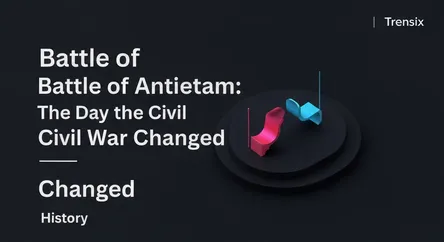History
Battle of Antietam: The Day the Civil War Changed

An overview of the Battle of Antietam on September 17, 1862, the bloodiest day in American history and a crucial turning point in the Civil War.
What is it?
The Battle of Antietam, also known as the Battle of Sharpsburg, was a pivotal American Civil War engagement fought on September 17, 1862, near Sharpsburg, Maryland. It was the culmination of Confederate General Robert E. Lee's first invasion of the North. Union Army Maj. Gen. George B. McClellan's Army of the Potomac confronted Lee's Army of Northern Virginia in what remains the single bloodiest day in American history. The brutal, twelve-hour battle saw intense fighting at locations like Miller's Cornfield, the Sunken Road ("Bloody Lane"), and Burnside's Bridge, resulting in a combined total of over 22,700 casualties.
Why is it trending?
Historically, the battle is considered a major turning point. Although tactically inconclusive, the Union victory was significant enough to give President Abraham Lincoln the confidence to issue the preliminary Emancipation Proclamation five days later. This fundamentally changed the goals of the war, transforming it from a conflict solely about preserving the Union into a fight for human freedom. The victory also discouraged the British and French governments from recognizing the Confederacy, effectively ending the South's best chance for foreign intervention.
How does it affect people?
The battle's immediate impact was the staggering loss of life, which brought the horrific reality of the war to the public in an unprecedented way through newly emergent photographic technology. For soldiers, it shattered any remaining illusions of the glories of war. On a national level, the strategic victory bolstered sagging Union morale and provided a crucial political victory for Lincoln ahead of midterm elections. Its most profound effect was paving the way for the Emancipation Proclamation, which initiated the end of slavery in the United States and reshaped the nation's identity and moral compass.